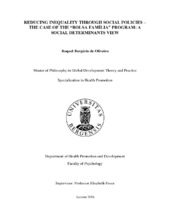| dc.contributor.author | Bergaria De Oliveira, Raquel | |
| dc.date.accessioned | 2019-01-16T12:19:50Z | |
| dc.date.available | 2019-01-16T12:19:50Z | |
| dc.date.issued | 2018-12-19 | |
| dc.date.submitted | 2018-12-18T23:00:02Z | |
| dc.identifier.uri | https://hdl.handle.net/1956/18905 | |
| dc.description.abstract | Background: In the past thirty years, poverty has been reduced significantly; however, its eradication is still a global challenge. Efforts have been made in the international context to tackle poverty and inequality. Conditional cash transfer programs (CCTs) have emerged as a new paradigm that has shifted the antipoverty policy agenda in Latin America and in the global South as a whole. The Bolsa Família Program (Family Grant, PBF) was created in Brazil in 2003, aiming to reach the most vulnerable people. Research objective: The main objective of the present study is to analyze the PBF in the light of the Social Determinants of Health (SDH) as a public policy from a historic perspective. It is important to determine whether the policy to tackle poverty and inequality has been handled at the state or government level, and if and how different governors have influenced the PBF to reach its goals. Methods: A qualitative case study was conducted in which ten policy makers from the Ministry of Social Development were interviewed (semi-structured interview guide). A thematic network analysis was the model chosen for this study. Findings: The findings show that the PBF has been effective in reducing poverty and inequality in Brazil and has made a positive impact in education and health among beneficiaries. Conditionalities (with a focus on rights guarantee), a decentralized model with central-local management, and the effort of intersectoral action have been the instruments to achieve its goals. The program has a strongly technical management but has also received a government stamp and is still vulnerable to the influence of the political context. Conclusion: Despite its effectiveness, the PBF alone is not enough to tackle poverty and inequality; structural changes are necessary to develop a welfare state in Brazil. | en_US |
| dc.language.iso | eng | eng |
| dc.publisher | The University of Bergen | eng |
| dc.subject | poverty | eng |
| dc.subject | inequality | eng |
| dc.subject | conditional cash transfer (CCT) | eng |
| dc.subject | Programa Bolsa Família (PBF) | eng |
| dc.subject | the Social Determinants of Health (SDH) | eng |
| dc.title | Reducing Inequality through Social Policies - The Case of the "Bolsa Família" Program: A Social Determinants View | eng |
| dc.type | Master thesis | |
| dc.date.updated | 2018-12-18T23:00:02Z | |
| dc.rights.holder | Copyright the Author. All rights reserved | eng |
| dc.description.localcode | GLODE330 | |
| dc.subject.nus | 736901 | eng |
| fs.subjectcode | GLODE330 | |
| fs.unitcode | 17-33-0 | |
